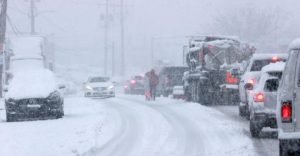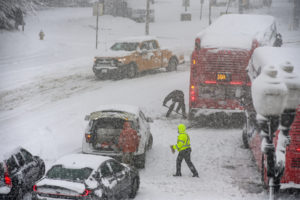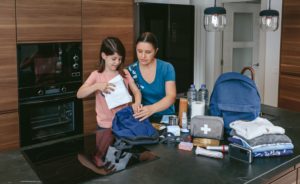It was a 27-hour ordeal – motorists were trapped in ice and snow on a 50-mile stretch of I-95 in Fredericksburg. Hundreds were stranded, and though it was freezing outside, many were forced to shut off their cars to conserve gas.

Photo credit: Yahoo! News
Officials in Virginia are getting hit with questions about how this situation could have escalated the way it did. In the meantime, we feel it’s important to provide safety tips, should you ever find yourself stuck on the road in winter weather.
The key to surviving this type of ordeal is preparation. If there is a winter storm coming, always be sure to have at least a half tank of gas in your car. And an emergency kit with essentials may take up extra space in your trunk, but it could also save your life.
Before we learn how to prevent such an emergency, let’s cover the first steps you should take if you find yourself in this predicament.

Photo credit: The New York Times
I’m stranded in snow and ice – what should I do?
- Contact the Virginia Department of Transportation (or VDOT) Emergency Response, at: 1-800-367-7623
- Don’t spin your wheels, which will dig you in deeper. Instead, turn the wheels from side to side, in order to flatten the surrounding surface area.
- Clear any snow or ice from your exhaust pipe, to ensure that there is no build-up of carbon monoxide in your car. If it continues to snow, continue to check.
- Try gently rocking your car back and forth by switching from reverse to drive mode, lightly touching the gas each time.
- Stay in your car. Cold and blizzard-like conditions could disorient you. If you see a lit building nearby, it may be safe to seek shelter there.
- Turn your car off to conserve gas, and only turn it on every once in a while for an extra hit of heat. Stay warm by exercising with push-ups, sit-ups or flutter kicks.
- Stay hydrated.
- Stay in your car with the seat belt on and hazard lights flashing, as the road conditions might allow another car to strike yours.
- If you have a shovel in your car, clear the area around your tires.
- If you have sand, salt, or cat litter, sprinkle the shoveled area around your tires to help your tires gain traction.
What should I keep in my car emergency kit?
Before we touch upon the necessities for snow and ice, every car should keep these essentials on hand all year long:
- A standard automotive tool kit
- Jumper cables
- Safety flares
- Flashlight
- First Aid kit
- Spare tire, wheel wrench, and tripod jack
- Extra batteries
- Portable charger
- Flashlight
- Old pair of sneakers (in case you’re stranded in impractical footwear)
What should be in my winter weather emergency kit?
In addition to the standard necessities listed above, you can add and take away seasonal items. When it starts getting cold, include a bag or box containing the below items with your kit. When spring comes, you can remove these items to increase storage in your trunk.
Winter weather necessities include:
- An ice scraper with a snow brush
- Extra windshield fluid
- Extra antifreeze
- Blanket
- Extra hats, gloves, and scarves
- Shovel
- Tire traction aids, such as salt, sand, or cat litter, which melt ice
- Non-perishable snacks
- drinking water
What kind of non-perishable snacks should I pack in my emergency car kit?
The National Safety Council recommends high-energy snacks, such as:
- Unsalted nuts
- Dried fruit
- Hard candy
- Drinking water
What are some non-essentials that would be helpful in my emergency car kit?
If you’re ambitious and have plenty of room in your trunk, why not be fully stocked? You can add the following to your emergency kit:
- Reflective triangles
- A brightly-colored or neon cloth to drape across your car to make more visible
- Reflective vest
- Compass
- Fire extinguisher
- Duct tape
- Rain poncho
- If you have pets: Extra pet food, extra drinking water, leash, collar, and harness
Follow the above tips, and you will likely have little to worry about. Preparedness is key, and a half tank of gas and emergency kit can make all the difference when winter weather strikes. Stay safe!
If you or a loved one has been injured in a winter weather accident through no fault of your own, you may be eligible for compensation. Reach out to Allen & Allen today for a free consultation, at 866-388-1307.





